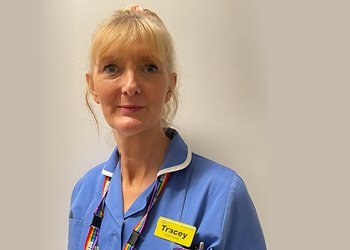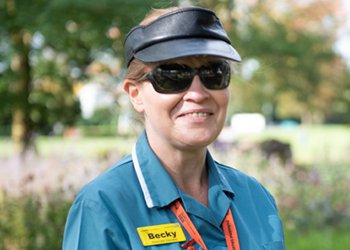Late Career stories
Supporting our staff to stay and stay well at work is a key priority for our organisation and across the NHS. Everyone who works for us should feel valued and supported to work in a way that meets their individual ambitions and needs
Retaining and supporting our people is a key priority across the NHS. Approximately a third of the NHS workforce are in the late stages of their career and it is important we retain the skill, experience and knowledge of these colleagues.
What people want from their career may change over time and with people choosing to work for longer, it is even more important that in the later stages of their career, our NHS people are supported to continue working in a way that supports these changes.
All our NHS people should feel valued and supported to work in a way that meets their individual ambitions and needs. Colleagues in late career have a wealth of skill, experience and knowledge to impart, and it’s important that we support them, and all our NHS people, to stay and stay well.
The following stories highlight how our NHS people in late career have been supported to stay and stay well in the NHS through interventions aligned to the People Promise.
Maria's story

I have worked for the NHS for almost 20 years.
I’ve stayed because of the support from my previous managers and my current line manager. They have given me flexibility with my shifts which has helped me to function at my best and give the best care to my patients and at the same time have a balance between my personal and family relationships and work responsibilities.
Maria fe Caspillan, 51, Staff nurse
Shelly's story

I had a wonderful job as head of catering services which I loved. Unfortunately, due to health conditions I was really struggling with my work life balance and I either had to take time off work or spend my rest days in bed to get over the previous week I had worked.
As I was 57 years old, I was given a few options as I knew I could not carry on the way I was. One option was to retire and return as a Senior Catering Projects Manager which I have now been doing for just under a year. Wow what a massive change to my lifestyle and I feel so much better. Yes I still get days when I struggle but because I only work two days a week if I get up one day for work and I’m not well then I just go in on another day. My organisation were brilliant and I truly felt valued for what they did for me.
Shelly Alder, 58, Senior Catering Projects Manager
Josephine's story

I had been a nurse in the NHS for three decades and after some time away coupled with some personal challenges, I felt ready to return. My acute clinical skills needed updating before I could return to practice, but my trust placed me on a bespoke course, the return to acute care program.
I’ve now completed this unique course and although the journey has been difficult at times, I am so glad I stuck it out. I now feel part of a very dedicated team. The support I received from the practice education department was amazing and kept me going through some dark days. I have just been promoted to Clinical Nurse Educator, so this is a real success story for me.
Josephine Woodford, 58, Clinical Nurse Educator
Tracy's story

I undertook my nursing training at the age of 50 has been a civil servant for 24 years. As a single parent of two children, both with medical conditions, I delayed my training until they were in their 20s and stable enough. Then it was time for me to concentrate on having some time for myself.
My nurse training coincided with the pandemic, making it both difficult and unique. Having successfully completed my nurse training, I am now working full-time in the acute medical unit at Gloucestershire Royal Hospital.
Tracy Tye, 54, Registered Nurse
Becky's story

When I moved to my current job, where I teach and support new staff, the lighting in the office affected me badly and made it difficult to work. I wear sunglasses and caps because of my visual impairment.
I talked to my manager Maria, and she was so accommodating, offering me an alternative space to work and making adjustments. Without these changes, I wouldn’t be able to do my job. From a disability point of view, the NHS has been amazing.
Becky Fell, 50, Associate HCSW Development Educator
Kate's story

I used to work as a deputy director in a clinical role but I wanted to find a new job that would offer more flexibility and give me experience outside of my clinical work. I am now part of a new team and my new manager is incredibly supportive, offering training both in house and external to enable me to get accreditation as a health and safety advisor.
I am employed for 30 hours per week and this suits both the requirements of the job and my personal life. I have been welcomed into the new team and feel very happy that I am able to learn a new skill and gain new qualifications whilst supporting teams within the hospital that I have worked with for many years.
Kate Harrison, 58, Risk, Health and Safety Advisor
Steve's story

As you get older, it’s harder to work 24 hours a day. I think I was at risk of experiencing burnout. I would have probably dropped out of ICU – which is what I’ve been training for all these years and just done anaesthetics.
Fortunately, In the hospital I work at we have halved the number of nights people have to do on the on-call rota. I have taken advantage of that, so in the last 3 years, I have worked half the time on-call. This has helped us retain the skills and experience of people like me who are older and more senior – it allows us to continue to work in high-stress environments without leading to a burn out stage.
Steve Twigg, 52, Consultant in Anaesthesia & Critical Care
Late career support
If you work for us and need support, please speak to your line manager about the positive changes you could make together that may allow you to continue working in the NHS in a way that suits your changing needs and circumstances.
Line managers can use the Improving staff retention: a guide for line managers and employers, from NHS England’s National Retention Programme and NHS Employers to support you to help talented and skilled staff achieve their individual ambitions in the workplace, whilst delivering the highest levels of care.
